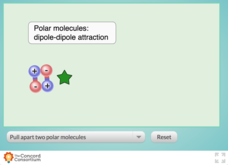K20 LEARN
The Attraction is REAL
How attractive is your intermolecular forces lesson plan? Draw your class in with an activity that includes research, presentation, and demonstrations. Chemistry scholars work together to create claims about the each intermolecular...
Concord Consortium
Comparing Dipole-Dipole to London Dispersion
Which intermolecular force is the strongest? Scholars test the relative strength of London dispersion forces, dipole-dipole interactions, and induced dipoles using a simulator. The interactive allows learners to pull on paired molecules...
Science Geek
Intermolecular Forces of Attraction
Chemists love London (dispersion forces)! Presentation begins with an explanation of intermolecular forces including hydrogen bonding, dipole-dipole attraction, and London dispersion forces. It also covers polarity and the relative...
Urbana School District
Magnetism
The compass was first used in 206 B.C., but we didn't discover magnetic poles until 1263 A.D. Presentation begins with the history of magnetism before continuing on to magnetic fields, magnetic forces, electromagnets, currents,...
PHET
Mapping the Field of a Dipole Magnet
High school scientists build their own magnetometer and use it to map the field surrounding a bar magnet. Excellent background resources is included, as well as a diagram of how to build the magnetometer.
Curated OER
8.4 Section Review ~ Polar Bonds and Molecules
A very neat worksheet has been produced by Pearson Education, Inc. for use in a general chemistry class. The first nine questions are fill in the blanks for a paragraph about types of bonds and electronegativity. Five true-false...
Curated OER
Magnetism
This set of seven activities attracts physical science stars to concepts concerning magnetism. Pupils play with a lodestone, magnets, needles, and iron filings to understand magnetic forces, fields, and applications. If you are new to...
Michael Blaber, PhD
Fsu: Molecular Geometry and Bonding Theories: Polarity of Molecules
Florida State University provides a discussion of polarity of binary and polyatomic molecules, with tables and graphics.









